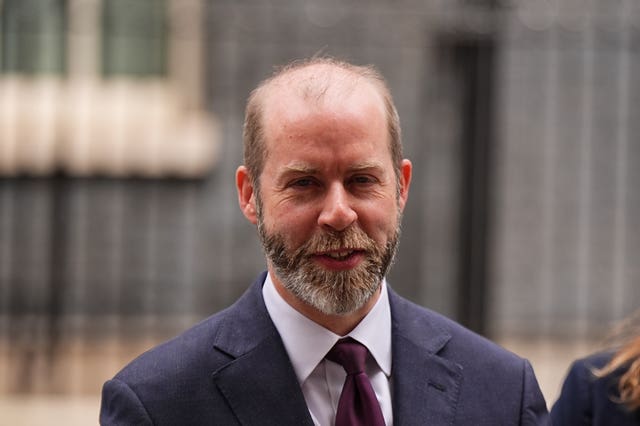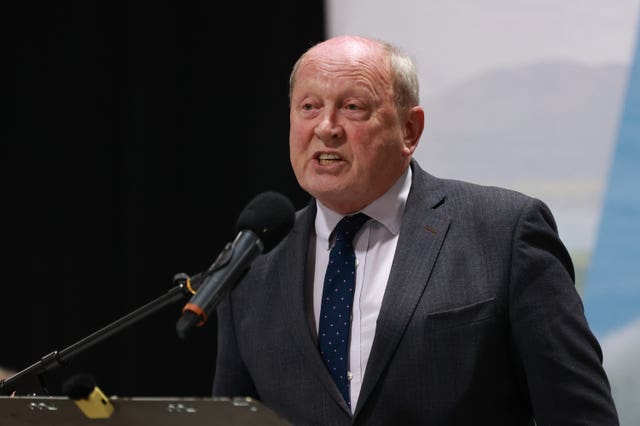Ministers under fire amid concern over impact of trade deals on Northern Ireland
Business Secretary Jonathan Reynolds attempted to ease concerns in his response to an urgent question in the House of Commons.

UK ministers have come “nowhere close” to addressing concerns over trade deals creating a “huge disadvantage” for manufacturers and consumers in Northern Ireland, MPs have heard.
TUV leader Jim Allister issued the warning after Business Secretary Jonathan Reynolds insisted the Government has “closely considered” the impacts of the US-UK trade agreement on Northern Ireland.
The agreement secures reductions in the 27.5% tariffs imposed by the United States on the UK car industry and removes tariffs imposed by the US on steel and aluminium, according to the Government.

Mr Reynolds, responding to an urgent question, told the Commons: “I want all Northern Ireland colleagues to know that the importance of Northern Ireland in this deal and all trade deals is something which is paramount to me personally and I commit absolutely to working with any colleague from Northern Ireland on the implementation of agreements of this sort.”
He added: “Firstly, as Northern Ireland is part of the UK’s customs territory and internal market, Northern Ireland exporters can access the US market under this deal on the same preferential basis as the rest of the UK.
“Secondly, this deal does not affect how imports to Northern Ireland operate. US origin goods will be able to benefit from this deal where they are not at risk of entering the EU.
“As a result of the Windsor Framework, Northern Ireland businesses importing eligible US goods under this deal can avoid any unnecessary duties with established schemes, such as the UK internal market scheme.”
Mr Reynolds said there is also a “comprehensive tariff reimbursement scheme”, noting the difference between UK and EU duty can be claimed back “so long as it can be demonstrated that the goods did not enter the EU single market”.
The Windsor Framework, and its predecessor the Northern Ireland Protocol, require checks and customs paperwork on goods moving from Great Britain into Northern Ireland.
Under the arrangements, which were designed to ensure no hardening of the Irish land border post-Brexit, Northern Ireland continues to follow many EU trade and customs rules.
Mr Allister told Mr Reynolds: “The minister came nowhere close to addressing the issues which arise from the fact that this Government and this House does not control the trade laws of a part of this United Kingdom, namely Northern Ireland, because under the Windsor Framework Northern Ireland was placed under the EU’s customs code and therefore it is its tariffs not the UK’s tariffs which govern the imports to Northern Ireland.
“And with the EU having no trade deal with the US or with India, the resulting tariffs on imports under this deal will be higher when the goods come to Northern Ireland than to GB – for manufacturing and for consumers.
“This creates huge disadvantage and fundamentally contradicts the equal citizenship which is supposed to denote a United Kingdom.”

Mr Allister added: “In terms of steel, under the deal, will it now not be easier for US manufacturers to buy steel from Great Britain tariff-free than for manufacturers in Northern Ireland to buy the same steel from their own country to bring it into their own country in Northern Ireland, because that steel will be subject to EU tariffs?
“How could that ever be compatible with Northern Ireland being supposedly part of the EU’s internal market?”
Mr Reynolds said he believes the approach adopted by the previous Conservative government under the Windsor Framework to “balance both the realities of Brexit, of leaving the single market when Ireland is within the EU and customs union” alongside commitments under the Good Friday Agreement was “fundamentally a better one” than original options considered.
He acknowledged the complications associated with the arrangements before offering to meet MPs from Northern Ireland to discuss any issues.
For the Conservatives, shadow trade minister Greg Smith said he remains “unconvinced” by Mr Reynolds’ answer on whether the agreement will protect the special status of Northern Ireland.
In response to a call from the Liberal Democrats for a vote on the agreement, Mr Reynolds said: “The position is as it always has been – Parliament has a key role in scrutinising any treaty.
“Any change that requires legislation or changes to our domestic laws go through the Parliament in the usual way.”





